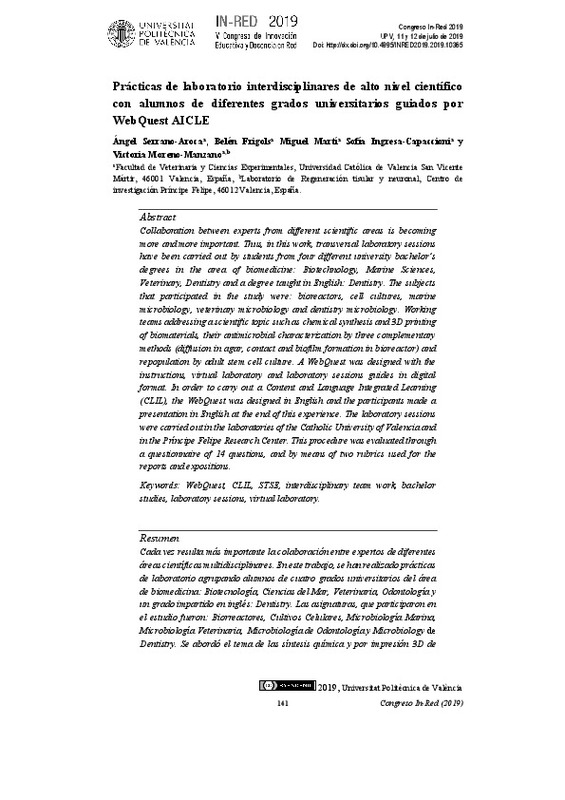JavaScript is disabled for your browser. Some features of this site may not work without it.
Buscar en RiuNet
Listar
Mi cuenta
Estadísticas
Ayuda RiuNet
Admin. UPV
Prácticas de laboratorio interdisciplinares de alto nivel científico con alumnos de diferentes grados universitarios guiados por WebQuest AICLE
Mostrar el registro completo del ítem
Serrano-Aroca, Á.; Frígols, B.; Martí, M.; Ingresa-Capaccioni, S.; Moreno-Manzano, V. (2019). Prácticas de laboratorio interdisciplinares de alto nivel científico con alumnos de diferentes grados universitarios guiados por WebQuest AICLE. En IN-RED 2019. V Congreso de Innovación Educativa y Docencia en Red. Editorial Universitat Politècnica de València. 141-155. https://doi.org/10.4995/INRED2019.2019.10365
Por favor, use este identificador para citar o enlazar este ítem: http://hdl.handle.net/10251/126775
Ficheros en el ítem
Metadatos del ítem
| Título: | Prácticas de laboratorio interdisciplinares de alto nivel científico con alumnos de diferentes grados universitarios guiados por WebQuest AICLE | |
| Autor: | Serrano-Aroca, Ángel Frígols, Belén Martí, Miguel Ingresa-Capaccioni, Sofía Moreno-Manzano, Victoria | |
| Fecha difusión: |
|
|
| Resumen: |
[ES] Cada vez resulta más importante la colaboración entre expertos de diferentes áreas científicas multidisciplinares. En este trabajo, se han realizado prácticas de laboratorio agrupando alumnos de cuatro grados ...[+]
[EN] Collaboration between experts from different scientific areas is becoming
more and more important. Thus, in this work, transversal laboratory sessions
have been carried out by students from four different university ...[+]
|
|
| Palabras clave: |
|
|
| Derechos de uso: | Reconocimiento - No comercial - Sin obra derivada (by-nc-nd) | |
| ISBN: |
|
|
| Fuente: |
|
|
| DOI: |
|
|
| Editorial: |
|
|
| Versión del editor: | http://ocs.editorial.upv.es/index.php/INRED/INRED2019/paper/view/10365 | |
| Título del congreso: |
|
|
| Lugar del congreso: |
|
|
| Fecha congreso: |
|
|
| Tipo: |
|








